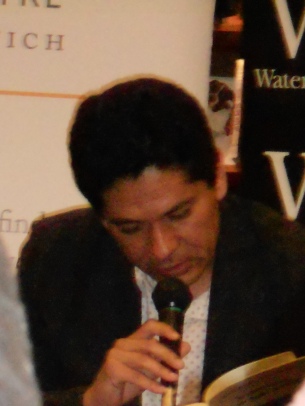Excitement abounded on Tuesday evening when my friend Sarah and I headed into Norwich Waterstones to hear Juan Pablo Villalobos and translator Rosalind Harvey reading from Quesadillas, his new novel just published by And Other Stories, at an event put on by the Writers’ Centre.
While his father preaches Hellenic virtues and practises the art of the insult, Orestes’ mother prepares hundreds of quesadillas for Orestes and the rest of their brood: Aristotle, Archilocus, Callimachus, Electra, Castor and Pollux. She insists they are middle class, but Orestes is not convinced. And after another fraudulent election and the disappearance of his younger brothers Castor and Pollux, he heads off on an adventure.
Orestes meets a procession of pilgrims, a stoner uncle called Pink Floyd and a beguiling politician who teaches him how to lie, and he learns some valuable lessons about families, truth and bovine artificial insemination.
With Quesadillas, Juan Pablo Villalobos serves up a wild banquet. Anything goes in this madcap Mexican satire about politics, big families, and what it means to be middle class.
Asked about the differences between this and his first novel Down the Rabbit Hole (also translated by Rosalind Harvey and published by And Other Stories), Juan Pablo explained that the books reflect two sides of Mexican reality. Tochtli (in DTRH) doesn’t understand what is going on around him; Orestes does, and is pissed off about it. This leads to a difference in humour with the naivety of DTRH replaced by angry satire or parody.
There is a surreal element to Quesadillas, partly inspired by and partly in reaction against André Breton‘s famous remark that “Mexico is the most surrealist country in the world”. Juan Pablo believes that this quotation has been adopted by Mexico to such an extent that it has become part of the national mentality and an excuse for everything. He also gets frustrated by the way outsiders see Latin American writing, as if magical realism is all there is to it, so in this book he was trying to explore the limits between reality and surrealism from the perspective of parody.
The novel also contains a mixture of historical and autobiographical facts, “whizzed up in a blender” with nonsense fiction to see what would happen. It is set in the author’s home town, which apparently proved a little problematic when he returned to read from it at the book fair there.
There was also a lot of discussion about the difficulty of being taken seriously as an author if you write funny books, in Spanish and English alike. Juan Pablo said that he has tried to be serious, but can’t manage it. He likes subversive and irreverent literature and the fact that to laugh at something dark you need to suspend your logic and emotions – then comes the thought “I shouldn’t be laughing at this” – and the idea of the tragi-comic as an approach to reality and a way to resist the system.
Rosalind was asked what appealed to her first about this novel. With DTRH, she, like all of us, was first gripped by Tochtli’s voice, although she disagrees with Juan Pablo that he is more of a voice than a character. To her (and to me) there is a very real little boy behind that voice. With Quesadillas, it was the humour and plot that came first for her. It was also interesting that having spent time with Juan Pablo promoting DTRH – they met at the Edinburgh Festival – she could then hear his voice in her head while working on Quesadillas. This is similar to what the translators of the Polish Boxer said about Eduardo Halfon and something I have yet to experience to that extent.
Three cheers also to Juan Pablo for his remark that “translators are writers” and his clear appreciation of the work of Rosalind and all his other translators around the world. He has recently published a translation himself, from Portuguese into Spanish, and considered it much harder work.
We heard the author read the opening of his novel – incidentally its Spanish title translates literally as “If we lived somewhere normal” and there was much amusement when he remarked on the economy of English in shortening all that to “Quesadillas” – interspersed with Rosalind reading her translation. And yes, it’s very funny. And yes, it’s very dark. After all this, I’m just longing to read it!
(Photos mine so apologies for the poor quality!)
Related articles
- ‘Down the Rabbit Hole’ by Juan Pablo Villalobos (kimbofo.typepad.com)
- Literature_all Dogs Are Blue by Rodrigo Souza Leão (culturalbrazil.org)




It was my favourite And Other Stories book so far Rachel. I didn’t quite get Down the rabbit hole – read it twice because I felt I must have missed something – but Quesadillas was wonderful.
I’m really looking forward to it!
Pingback: A Place to call Home | Una Vista Diferente
Pingback: Quesadillas by Juan Pablo Villalobos | Matt Lewis
Pingback: Quesadillas – Juan Pablo Villalobos, tr. Rosalind Harvey | a discount ticket to everywhere